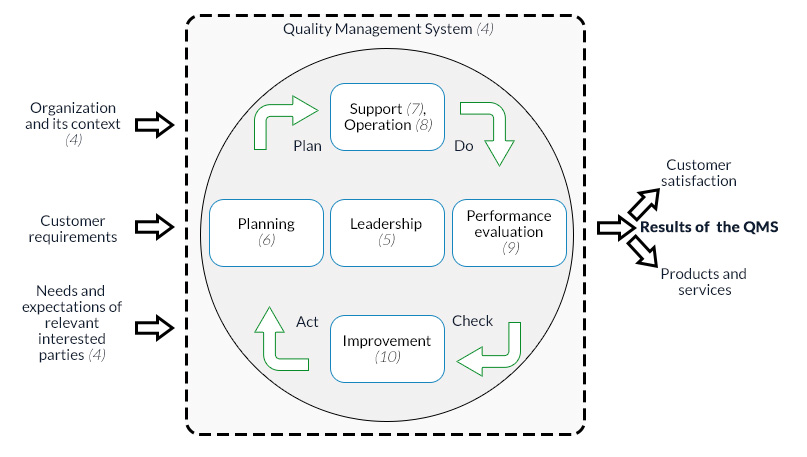Quality Management System (QMS) is a process that defines the purpose of quality by implementing the framework and activities necessary to improve all important areas of an organization. It causes continuous improvement, and efficiency within an organization.
The basic idea of Quality Management System (QMS) is to define a correct procedure in a project that will give quality services and customer satisfaction, and eliminate all errors within the project, and not after its delivery to the consumer or customer.
The world’s demand for the products is growing increasingly. Along with the rise in demand, the competition between the different companies is growing as well. The basis of this competition is now on quality which can only be addressed by implementing Quality Management System (QMS) in organizations.
BENEFITS OF IMPLEMENTING QUALITY MANAGEMENT SYSTEM (QMS)
There are several benefits in using Quality Management System (QMS) in an organization:
- Well defined Organizational framework
- Accurate procedures and methods
- Quality product
- Proper management
- Satisfaction of the customer
- Data management
- Transparency
- Continuous improvement
- Increased production
- Fewer defects
- Increased reward
- Sustainability
ISO 9000 SERIES OF QUALITY MANAGEMENT SYSTEM (QMS) STANDARDS:
The standards are published by ISO, the international organization for standardization. ISO 9000 is the series of Quality Management System. It is designed to enable organization to ensure the customer quality requirement, increase customer satisfaction and to enhance continuous organizational improvement.
ISO 9001
ISO 9001 is an international quality management standard. It is one of the known, most popular quality management standards in the world. It is worldwide accepted and can be applied to all types of organizations. An organization should implement ISO 9001 for the satisfaction of the customer by meeting their requirements.
ISO 9001 Basic Process Model

7formations have vast experience of Quality Systems implementation in following industries:
- Health care( medical devices manufacturing and hospital services)
- Fresh food processing
- IT contracting services
- Software development (small to mid-size corporations)
- Solid state chips manufacturing
- Textile and fiber industry
- Medical R & D
- Clinical research and Trials industries
- Government contracting agencies
LEAN QUALITY SYSTEMS:
Lean quality system means applying lean principles to your quality management system. This system increases the profit of the organizations through ISO training, Quality Management System implementation and quality audits. 7formations’ helps its clients to adopt quality systems with lean principles. Few examples of lean implementation;
- Avoiding over documentation of QMS
- Continuous improvement
- Agile principles implementation
- Avoid duplication of documents in Quality Manual
- Value stream mapping concept in documentation
- Change management system
- Avoid waste of time in lengthy approval process of documentation
- Reduce waste of money in overkilling of process
One integrated system- Our unique Quality approach
There is often a high degree of compatibility between the management system standards, although they cover different areas. Many organizations choose to build their management system into one integrated system, covering areas such as quality, health and safety, and the environment. By integrating several standards into one management system, you can eliminate duplication of work.
One audit approach
An integrated management system will allow us to keep our documentation simple by avoiding a complete set of new documentation for each individual standard.
7formations recommends its clients the best fit option in implementation but whether our clients choose this integrated system approach or build parallel management systems to cover each area, still all of business’s critical areas can be evaluated in a single combined audit.
Added value of process implementation effort
Conducting internal audits of management systems simultaneously will not only save company’s time, effort and money but also increase the effectiveness of management system. 7formations offers you a combined internal audit designed to enable cost-effective audits. Some certifying bodies also offer this kind of registration audits.
